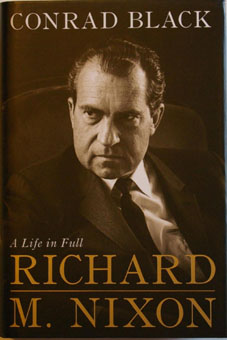The Master Pragmatist: Richard M. Nixon: A Life in Full;
by Conrad Black
By R. Alan Clanton
Thursday Review Editor
Richard M. Nixon: A Life in Full; Conrad Black. Originally published in 2007, Conrad Black’s sweeping, magisterial biography of Richard Nixon re-set the bar for exhaustive studies of the man who would become arguably the most controversial and polarizing president in American history. By the time of this book’s release, other authors had successfully tackled the life of Nixon (Jonathan Aitken, Stephen Ambrose, Irwin Gellman, to name but three), but what Black clearly sought here was a single volume study of the full arc of Nixon himself—childhood, teenage years, young adult, Naval officer, and eventually ambitious young politician. Nixon was, from his earliest days, a striver and a dogged pursuer, and his lean, hardscrabble childhood forged a young man of relentless tenacity—a shrewd young politician with the singular ability to make almost as many enemies in a lifetime as he made friends. Black shows us this ambitious young man on his nearly vertical ascent from Congressman to Senator to vice-President, a man seen as undeniably savvy even by those who hated him early in his career.
Black also shows us Nixon the pragmatist and strategic thinker, and a politician with the unique skill to dodge political extinction not merely once or twice, but repeatedly nearly his entire lifetime. This inner survivalist force which Nixon possessed becomes a common thread throughout Black’s massive biography, and it is these precarious moments at the abyss which become Nixon’s common, binding themes: the savvy, resentful and darkly tactical litigator seeking with all deliberate malice to expose Alger Hiss as a fraud; the 39 year old nearly dumped as Eisenhower’s running mate in 1952; the unyielding tenacity of Nixon facing down Nikita Khrushchev at the World’s Fair; the coolness and level headed Nixon facing down violent demonstrators in Venezuela in 1958; the dogged Nixon squaring off against the handsome and elegant John F. Kennedy in the debates of 1960; the humiliated Nixon facing crushing defeat at the hands of Pat Brown in California in 1962. Ultimately, Nixon would prevail narrowly in the complex drama of 1968; then, only four years later, the man from Whittier would win re-election in what would become the greatest landslide in American history.
Black, clearly willing to offer as sympathetic a view of Nixon as possible through all one thousand pages, is also unblinking. Black is neither a Nixon-antagonist, nor is he engaged in a grand puff piece. The second Brit to pen a major Nixon retrospective (after Aitken), Black is able to offer a European dispassion—the foreigner’s eye not predisposed to the usual love/hate dynamic. Watergate is seen as tragedy—hubris which inevitably unravels the man who struggled his lifetime to reach his greatest heights.
Richard M. Nixon: A Life in Full is highly readable, and despite its thousand pages (plus another 150 for exhaustive notes, bibliography, sources and index) readers will find that it moves quickly and smoothly. This is an essential volume for your history bookshelf, and a book highly recommended for serious students of contemporary politics. Public Affairs; New York.

